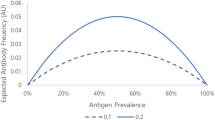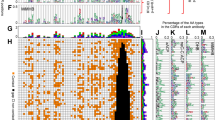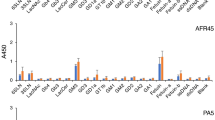Abstract
A STUDY of the properties of mixtures of different types of human anti-Rh sera has led to the recognition of what appears to be an incomplete antibody. The research arose out of a suggestion by Prof. R. A. Fisher that this technique might throw some light on the problem of antibody absorption.
This is a preview of subscription content, access via your institution
Access options
Subscribe to this journal
Receive 51 print issues and online access
$199.00 per year
only $3.90 per issue
Buy this article
- Purchase on Springer Link
- Instant access to full article PDF
Prices may be subject to local taxes which are calculated during checkout
Similar content being viewed by others
References
Wiener, Proc. Soc. Exp. Biol. and Med., 54, 316 (1943).
Race, Taylor, Cappell and McFarlane, NATURE, 153, 52 (1944).
Magraeth, Findlay and Martin, NATURE, 151, 252 (1943).
Shibley, J. Exp. Med., 50, 825 (1929).
Author information
Authors and Affiliations
Rights and permissions
About this article
Cite this article
RACE, R. An 'Incomplete' Antibody in Human Serum. Nature 153, 771–772 (1944). https://doi.org/10.1038/153771b0
Issue Date:
DOI: https://doi.org/10.1038/153771b0
This article is cited by
-
Convolutional neural network-based automatic classification for incomplete antibody reaction intensity in solid phase anti-human globulin test image
Medical & Biological Engineering & Computing (2022)
-
Bivalent Nature of Incomplete Anti-D(Rho)
Nature (1963)
Comments
By submitting a comment you agree to abide by our Terms and Community Guidelines. If you find something abusive or that does not comply with our terms or guidelines please flag it as inappropriate.



